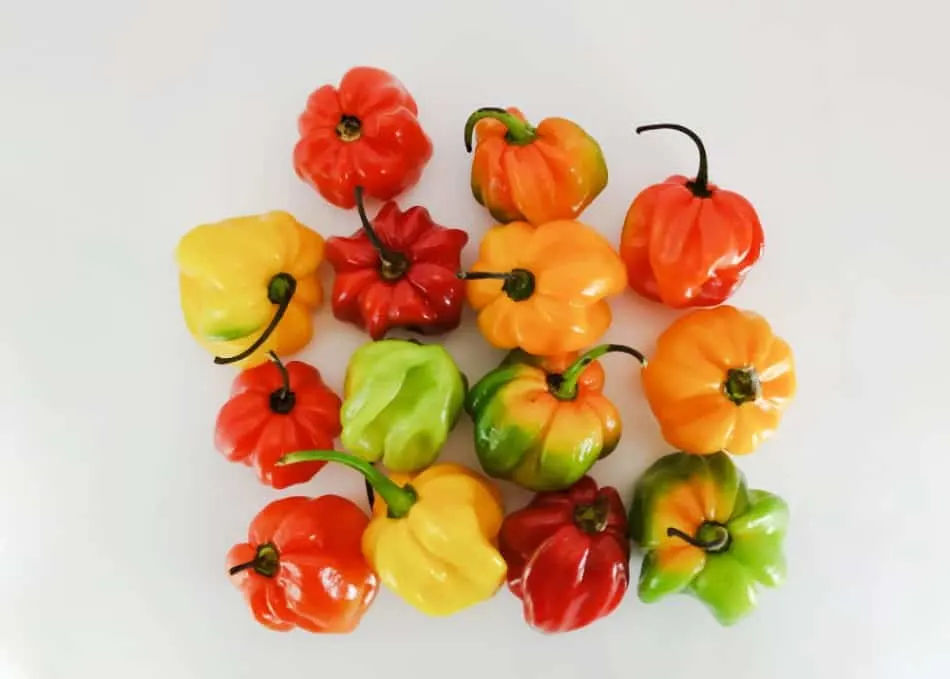If you are allergic to Bell or chili peppers or simply don’t have any in your fridge, it doesn’t hurt to have an alternative ready on hand.
The best substitutes for Bell peppers are zucchini, broccoli, celery, and carrots, depending on the dish you are cooking. The best replacements for chili peppers are black, white, and pink pepper or cumin since these spices will provide your dishes with some heat.

Why You May Need Bell and Chili Pepper Substitutes
There are three main reasons why you may not be able to eat Bell or chili peppers. These include a Bell pepper allergy, chili pepper allergy, and a nightshade plant allergy.
Bell Pepper Allergy
A Bell pepper allergy arises when your body rejects Bell peppers as a harmful substance. Basically, your immune system thinks that the Bell peppers are dangerous, so it develops antibodies called immunoglobulin E when you eat Bell peppers. This means that every time you eat a Bell pepper, the immunoglobulin E recognizes it and produces chemicals that result in an allergic reaction.
Bell peppers and chili peppers are closely related, meaning you may also have an allergic reaction when you eat chili peppers. However, some people with this allergy can safely eat a small amount of chili peppers without any issues. Talk to your doctor to determine which foods are safe for you to eat.
Chili Pepper Allergy
Just like with Bell peppers, some people have allergic reactions when they eat chili peppers. If you’re allergic to chili peppers, you may experience several symptoms, including itchy eyes and skin, rashes, diarrhea, swollen throat, and more.
Remember, having an allergic reaction is different than reacting to the spice itself. Some people think they are allergic to chili peppers, but they really having a hard time dealing with the capsaicin. Talk to your doctor to determine if you suffer from a chili pepper allergy or if you just don’t like (or can’t handle) the spice!
Nightshade Allergy
Some people are allergic to nightshades (also called Solanaceae) which are several species of flowering plants. Both Bell and chili peppers are considered to be nightshades, as well as many other common foods and spices, including:
- Potatoes
- Eggplants
- Tomatoes
If you have a nightshade allergy, you likely won’t be able to eat any foods in this family, including all forms of peppers. Therefore, you’ll need to find non-pepper substitutes to include in your meals!
Substitutes for Bell Peppers
If you are allergic to Bell peppers or you are just looking for some delicious alternatives to try, these substitutes might come in handy. Remember, we aren’t doctors! So please consult your physician to make sure these replacements are safe for you.
Zucchini
Like Bell peppers, zucchinis have a very subtle taste, making them an ideal way to sneak some veggies into any meal. They tend take on the other ingredients’ flavors in your dish, so you can make them taste any way you want!
When it comes to texture, zucchinis are smooth and watery, giving you a soft mouthfeel similar to Bell peppers, especially red or yellow Bell peppers. Additionally, they are incredibly versatile, permitting you to cook them however you desire. Whether you wish to fry, sauté, steam, or bake them, they’ll always taste fantastic.
As an added bonus, zucchinis are really healthy. They are an excellent source of folate and potassium, and they have low sugar content. Try adding them to savory casseroles or a stir fry to make these meals even more nutritious!
Broccoli
If you want something nutritious like Bell peppers but has a sturdier texture once cooked, give broccoli a try! This veggie is packed with fiber, protein, calcium, and several vitamins, including vitamins A, C, E, K, and B.
Broccoli is the ideal substitute for Bell peppers in stir fries or baked dishes. It’ll add a delightful earthy taste to your meals. While broccoli is slightly more flavorful than Bell peppers, it still blends well with other ingredients making it a great replacement.
Celery
Like Bell peppers, celery is a great filler to add to meals to give them a little more volume. They have a very subtle flavor, so you can add them to several dishes without knowing they are there! They are excellent additions for meat stews, soup bases, sautéed dishes, and more.
Carrots
Carrots have a firm texture and a sweet taste that makes them very similar flavor-wise to Bell peppers. They are also incredibly nutritious, providing you with a high source of beta carotene, fiber, vitamin K1, potassium, and antioxidants, making them a healthful addition to your meals!
Carrots are an excellent substitute for red and yellow bell peppers since they offer a good amount of sweetness. They are also really good roasted, making them the ideal replacement for roasted Bell peppers.

Substitutes for Chili Peppers
If you are looking for some ways to add a little heat and flavor to your recipes without using chili peppers, try these flavorful substitutes!
Black Pepper
Black pepper is a commonly used spice made from peppercorns. This seasoning is entirely unrelated to Bell and chili peppers, making it safe for most people with Bell and chili pepper allergies to consume.
This seasoning has a biting, earthy flavor that adds a slight hint of heat to meals. While it isn’t as spicy as chilis, it still adds a substantial amount of flavor, making it an excellent substitute.
One of the best things about black pepper is that it is incredibly versatile, permitting you to use it on almost any dish. Simply sprinkle a little bit of black pepper on your dish towards the end of cooking to give your food a little kick of flavor. You can also rub black pepper onto meats to provide them with a deep, smoky, and spicy taste that’ll make your mouth water.
White Pepper
White pepper is very similar to black pepper. It is actually made from black peppercorns that have had their outer skins removed. The difference between the two is that white pepper is a little milder, providing less spice. However, it still offers some heat and can give your mouth that incredible tingly sensation if you add enough. It is an excellent alternative to chili peppers, especially if you’re looking for a more moderate heat profile.
Pink Pepper
Pink pepper is a little bit milder and sweeter than its black and white cousins, making it a pleasing addition to several dishes. If you are looking for something that packs a tiny bit of heat complemented by sweet notes, pink pepper is the perfect substitute for you.
Cumin
Cumin is a flavorful spice that is often used as a substitute for chilis and peppercorns. It has a robust earthy flavor that provides a little bit of heat. This spice is ideal for adding flavor to several dishes, especially Indian curries, chutneys, and Mexican dishes. You can also use cumin in soups, rice dishes, sauces, breads, and so much more! While cumin isn’t as spicy as chili peppers, it’ll provide you with a pleasant, mild spice that will upgrade your dishes to a whole new level!
Closing Thoughts
If you are allergic to Bell peppers, chili peppers, or nightshade plants in general, then you might want some non-pepper substitutes to add to your meals. Some of the best substitutes for Bell peppers are zucchini, broccoli, celery, or carrots, depending on what you are cooking. For chili peppers, black pepper, white pepper, pink pepper, and cumin are great options since they pack a little bit of heat and flavor to add to your meals.
We hope this article has helped you find the perfect replacement!
